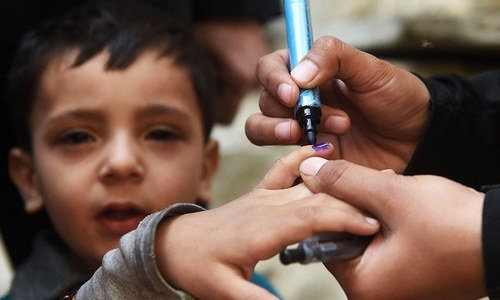THE impact of political polarisation in Pakistan is beginning to show in the country’s anti-polio efforts.
In a scathing report, the International Monitoring Board has attributed the vicious resurgence of polio in Pakistan this year to a “lack of political unity”. Describing the polio programme and related efforts as “a political football”, the report states that the recent resurgence of polio cases — 88 so far this year, including seven of the more dangerous P2 strain that had been eradicated in 2014 — reflects “a massive reversal of the trajectory to global polio eradication”, and that too in less than a year.
Pakistan reported more than 80pc of the total global polio cases this year, with the crippling disease detected in areas that had been polio-free as recently as the beginning of 2018. This is not the first time that lack of political consensus with regard to the anti-polio efforts has been pointed out. But the present report has drawn greater attention to the internal factionalism caused in large part by the prevailing brand of national political discourse. It has also highlighted the extent of damage to whatever progress Pakistan had made in it is anti-polio efforts over the years with the help of international donors.
In fact, deep political divisions are not specific to polio. Similar verbal sparring and blame games have hampered attempts at dengue control in Punjab and KP, as they have in Karachi where even municipal services such as garbage collection have been politicised. In addition, arbitrary bureaucratic changes and the inertia that has beset the civil service after the last elections have contributed to the crisis in provincial polio programmes. The fact that the polio programme, for all its flaws, has managed to continue is a tribute to the efforts of our polio workers who have had to face hostility from misinformed parents and threats to their lives by religious extremists.
The prevalence of polio was highest in 2014 when 306 cases were reported and the IMB had advised Pakistanis travelling abroad to carry immunisation certificates. However, the government had managed to restrict the active polio virus to a handful of locations in the country by 2018 and reduce the number of cases to eight.
With Prime Minister Imran Khan’s announcement to lead the vaccination drive himself, the PTI-led government appears well-intentioned. But it has allowed its petty rhetoric and open disregard for other political players to get in the way, leaving it with very little political capital to be able to have a constructive dialogue even on an issue as apolitical as polio eradication. One hopes that the government will reflect on the findings of the report so that it can lead a joint effort by all provincial health authorities and politicians to work towards the eradication of a national and global health risk affecting the future of millions of children.
Published in Dawn, November 21st, 2019













































